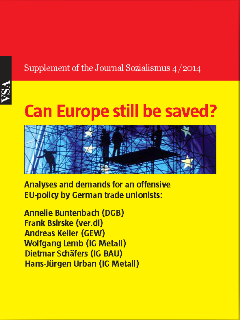
Thanks to Marco Siddi for the revision.
Enrico
Some remarks to “Can Europe still be saved?” – Supplement to n. 4 Sozialismus
“Can Europe still be saved?”, a small booklet that everyone can freely download here, was originally written in German for the review “Sozialismus”. After the publication, both Transform! and Sozialismus decided to translate it in English, following the principle that a new Europe needs a European-level debate.
As a consequence, I had the possibility to read this booklet, where prominent German trade union leaders expose their knowledge and opinion concerning the EU (European Union) and its future.
As pointed out by Dieter Scholz, the objective is “not as a defense strategy for the old idea of a European social model – which was not false but dismantled and corroded by neoliberalism – but as the forward strategy of »refound Europe!«”.
The booklet analyses different European domains, from general EU political economy to the “Bologna process” in the field of education. There are some practical requests and more abstract statements.
All the authors recognize that neo-liberalism has destroyed the European social model, and that the Troika, an anti-democratic power, had a great role in it.
Annalis Buntenbach put forward a practical request: “the European Parliament can take a case to the European Court of Justice against these violations of fundamental rights, and this is exactly what it should self-confidently do. Fundamental rights are violated in the area of professional life especially as regards the rights to professional freedom, free collective bargaining and fair remuneration for work”.
She’s right. We agree with her and we are ready to do that. But we will not be many in doing it. The reason is explained by the second author, Dietmar Schäfers: “[the] idea is to move towards this stealthily and in small slices so that those affected only get what is going on when the effects have already been made irreversible, in order to avoid social unrest”.
My intention is not to propose a comprehensive analysis of the book. In particular, I’d like to advance only three remarks:
1. It is not enough to struggle for “equal pay for equal work at the same place for all employees”, as Dieter Schäfers has written. We totally agree with it, but we propose to seriously discuss, and finally accept, as Trade Union, at European level, the Brancaccio’s proposal for a European wage standard (http://mesharpe.metapress.com/content/q03881805n760j68/?id=q03881805n760j68)
2. Frank Bsirske writes that “We now mainly need a European initiative for qualitative growth and employment. Europe needs an investment and construction programme – a LIFE plan (Let’s invest for Europe) – for the improvement of Europe’s infrastructure, the environment, and energy supply”. Actually, we cannot think that a simple keynesian answer to the crisis is the solution. We should try to experiment an historical new way of coming out of the crisis. We must build a new path that includes Keynes but goes beyond it. On the one hand, we must implement a moral reform of the elites. On the other, we must develop a systematic approach to the crisis at a global, supra-European level. Another way of production and other production relations are necessary and possible.
3. A question that could not be answered by the authors arises: we are against this European Union, and we want to completely change it, but what about a plan B? Can we imagine a left-wing exit from the European Union? How do we imagine internationalism if at European level the ruling classes continue to put our peoples in unemployment and poverty?
In the end, I completely agree with Lemb and Urban when they write that “alarm bells should be going off in trade unions. Indeed they are trying in especially crisis-torn countries to brace themselves against the economically, politically, and socially disastrous crisis policy. But there is little sign of a broad Europe-wide trade union resistance”.
In fact, trade unions are dead. Either they radically change themselves or they will remain unable to defend workers.
 Tags: Can Europe be saved? ; transform ; sozialismus ; Rosa Luxemburg Foundation ; European Left
Tags: Can Europe be saved? ; transform ; sozialismus ; Rosa Luxemburg Foundation ; European Left 
